#Injustice spoilers
Text
vividly remember being STUNNED when I read the injustice comic for the first time where Clark broke Bruce’s back, only for my shock to be fucking TRIPLED when Alfred showed up and curb stomped the absolute fuck out of Clark moments later. like, talk about an issue.
#bruce wayne#batman#dc#batfamily#clark kent#superman#Alfred mf pennyworth#alfred pennyworth#injustice#injustice: gods among us#injustice spoilers
436 notes
·
View notes
Text
ok so I was reading Injustice it was really sad and good and I loved it but I was growing increasingly sad for Batman because dang he couldn't catch a break his best friend lost his wife and unborn child and went crazy with grief so he was having to deal that and all the horrible things Superman was doing and said to him and then Damian snuck out behind his back to help Superman and betrayed him but I got to the asylum part and was just dying laughing because oh gosh it was chaos but then this happened
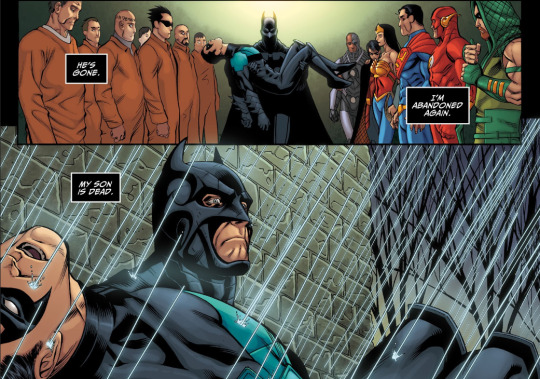
... I... I just cant oh my gosh why did this have to get so sad so quickly and the way everyone stops and stands there respectfully for Batman and Nightwing even the villains just ahhhh and the way Batman says to himself that he's been abandoned again AHHHHHHHH and oh my gosh Damian's face when he realized what he did
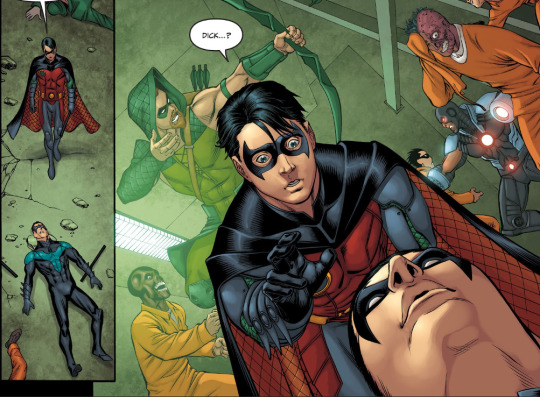
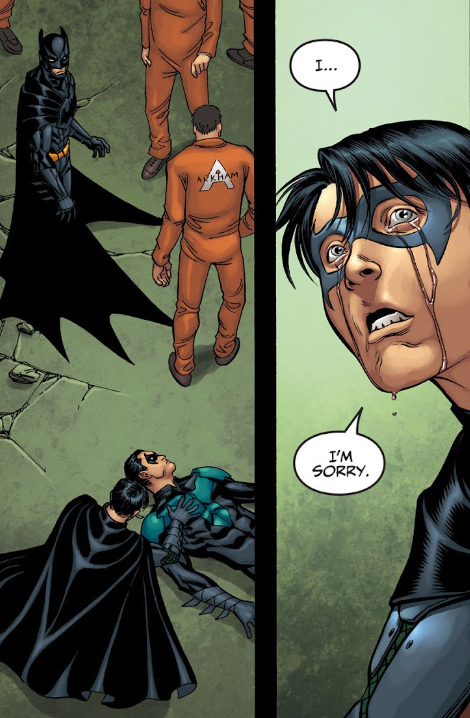
Yall did not tell me it was gonna be this sad 😭
#yall i'm crying so much right now#i gotta go read some nightwing comics where Dick is perfectly fine in his apartment with haley and babs because no i cant#dc comics#injustice#injustice spoilers#batfam#batman#bruce wayne#dick grayson#he doesnt die in every version does he????#damian wayne
33 notes
·
View notes
Text
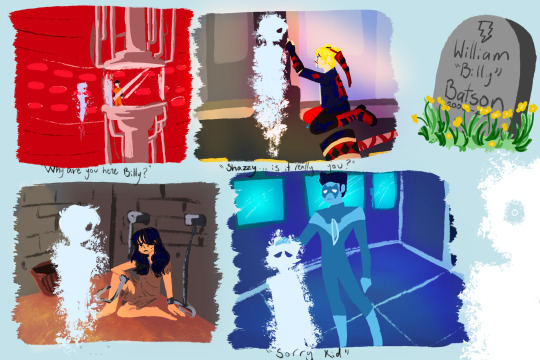
Thinking about billy in injustice.
Maybe because he died while in his powered form he got kind of stuck between the living and the dead and now just wanders as a monument to the horrors of supermans regime.
I think he would be angry at first, angry at superman for killing him, angry at himself for being involved in the regime but he would be incredibly sad too, he would mourn his life and the choices he made that lead to his death, but eventually he would also be proud of how he listened to Harleys advice and stood up to superman and kickstarted the beginning of the end for the regime.
#my art#shazam#billy batson#superman#captain marvel#fan art#wonder woman#nightwing#injustice#harley quinn#dc comics#dc#deadwing#mine#injustice gods among us#its might be a little hard to tell if you haven't read injustice but top left is superman in his maximum security prison cell#and bottom left is Wonder Woman jailed in thymeskyra for her involvement in the regime#and of course bottom right is deadwing#injustice spoilers#ignore my handwriting on the grave stone afskajkgfsgag I know its bad my handwriting sucks lmao#dick saying sorry is not just about billy being dead#its also about how dick possessed and depowered him multiple times throughout injustice#afgsjjafsgjkasffs
150 notes
·
View notes
Text
fabian’s insistence on calling someone to tell them about lucy & yolanda because he thought people just deserved to know, out of respect. both deeply sweet & incredibly gutting. (bill seacaster move over that’s MY darling boy)
#(who is also his own darling man boy but that’s besides the point)#fabian seacaster#fantasy high#fhjy#fhjy spoilers#dimension 20#ok sorry for all the posts this ep just gave me a lot of feelings it was so#the bad kids really felt like kids in this one for me. what an honor what an injustice & all that#fantasy high spin off season where it’s four episodes set during summer break and incredibly stupid my god please#FREE THEM
3K notes
·
View notes
Text
I don’t know how I’ve just realized this but like we’ve had a lot of injustice this season considering the fact that the big mystery is surrounding a fallen goddess of justice
Like we got
Riz possibly not being able to get into college
Sklonda having her pension withheld for no reason
Fig getting dropped from her record label
Gorgug having to take three years of artificer at once because he’s too nice (eventually having to shed that part of himself at times to succeed)
Fabian finally getting to go home to his mom after not seeing her for months only for her to immediately leave him alone for months on end when he clearly doesn’t know how to fend for himself
Adaine not performing well in class because she can’t afford her class despite having saved the world and literally being the elven oracle
Kristen literally getting expelled for something that had been cleared up before despite literally earning and working her ass off for an A
The Ratgrinders being so much farther ahead in everything than the Bad Kids because they found a way to cheat the system despite the Bad Kids literally saving the world
Like this definitely has something to do with the bringing back of the corrupted goddess of justice right?
#especially since kristen got expelled right after they accidentally broke oblivati mori#this is probably pretty obvious but in the recap for the newest episode brennan said something about injustice and this just clicked#autism (mads) speaks#fantasy high#fhjy#fhjy spoilers#fantasy high junior year#dimension 20#dimension 20 fhjy#d20 fantasy high#d20#d20 fhjy#ankarna#ankarna fantasy high
2K notes
·
View notes
Text
Oh. So when the Bad Kids kill a Helioic religious zealot it’s sooo great. But when I, Kipperlily Copperkettle-
#another injustice smh#kipperlilly copperkettle#buddy dawn#the bad kids™️#coach daybreak#fantasy high junior year#fantasy high#fhjy#fhjy spoilers#d20#dimension 20
505 notes
·
View notes
Text
I love how Dev Patel’s Character (I’m going to call him Hanuman) was told by his mother that his future can be found in the roots (lines) of his hands.
And how he tried to save his mother from the fire, grabbing with child’s hands, but instead burned his future away.
And how our first real view of them is when he bargains his way into a job that will lead him to the men that took his future away. Scarred, pale, blank and ruined.
Just like the monkey, Hanuman reached out to the burning desired life, and was supposedly stripped of his potential and power as punishment by the powers that be.
But then, with love and care from others battered, he was guided to his heart, and found it still beating and unfettered. A warrior’s heart.
And so drumbeat by drumbeat, he shaped himself, his hands, into a weapon of justice. To save the future. To remain nameless but to return vengeance upon those who would do others harm with no thought.
His hands, created by the past, shaped and balanced the future.
#I’m gonna keep rambling if I don’t stop now soooo#monkey man#monkey man 2024#monkey man (2024)#dev Patel#monkey man spoilers#I’m so glad Jordan peele saw this movies potential#I really appreciate those flashes of injustices within the movie#like Stop Killing Muslim Indians#god he’s so handsome
430 notes
·
View notes
Text

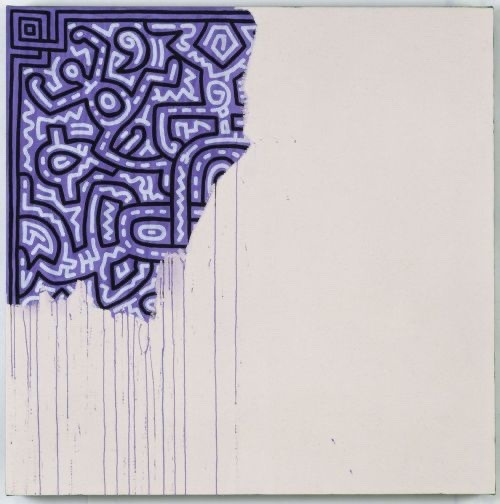
The Last of Us s1e3 “Long, Long Time” 2023 // Keith Haring “Unfinished Painting” 1989
#the last of us#tlou#something about this ep felt so authentically queer and I love it#the contrast between Haring’s painting being a statement of injustice and a sudden stop vs Franks being the end of a beautiful love story#ahHHHHHHHHHHHH#keith haring#spoilers#bill and frank
1K notes
·
View notes
Text
Hi I Fixed the Ahsoka Ending
The stormtrooper steps out of the ship, hands raised. It wasn’t like Hera has never seen that before. She raises her pistol, questions shooting through her mind. Why is this trooper alone, why did he hail them, and, most importantly, why is something about his walk so familiar? Suspense fills the air, and she can tell that everyone around her felt it, too. The last of the steam that has spilled out of the ship’s exhaust evaporates into the air, unlike that overwhelming sense of familiarity that’s flooding her heart. She braces herself for anything, setting her jaw. Had someone she’d once been close to become a stormtrooper? She runs through a list of names in her mind, nothing turning up any results.
Who are you and why’re you here? Chopper asks, apparently done waiting in suspense. The trooper gives no answer, continuing to step forward.
What, are you deaf or something? Are you, are you, are you? Chopper chatters impatiently. But then, instantaneously, his mood changes. Which isn’t really unheard of. Wait, Chopper mutters, starting to roll forward. Hera wonders if he’s picked up on the familiarity, too. He’s always been more perceptive than people give him credit for. Chopper heads straight for the trooper, his ever-squeaky wheels (no amount of oil can fix that issue, and Hera’s tried) filling the silence.
Who are you? Chopper asks as he stops at the trooper’s feet. And it’s at that moment that Hera realizes something: her mom sense is tingling.
It can’t be.
Huh? Huh? Huh? Chopper barks, until the trooper slowly extends one gloved hand and gently places it on Chopper’s head. Then his head spins around in giddy joy, his beeps turning into little excited ones. No words attached to them, just exclamations of happiness.
And, given that he usually hates people, there are only six of them Chopper’s ever gotten excited to see.
And Hera’s got a feeling she knows which one this is.
Sure enough, the trooper reaches up to grasp his helmet, and, when he pulls it from his head, the face that looks earnestly back at Hera is one she’s missed dearly.
He looks different now. Far from the boy he once was. Navy facial hair covers the lower part of his face, and his hair is longer and curlier than when she last saw it. It had never been curly before. Human hair never ceases to amaze her.
But he’s still got that effervescent light about him. Especially when he smiles at her, looking a little nervous, but there’s excitement spilling from him, too. She can feel it, as surely as she felt that she knew him as soon as he stepped out of that ship.
Hera doesn’t even realize she’s lowered her gun until her hand hits her thigh. Shock and joy are washing over her, wave after overwhelmingly powerful wave.
And grief. Because, though it doesn’t make sense, shouldn’t make sense, somehow, he looks so much like Kanan.
Though she already knows beyond a shadow of a doubt that this is her boy, a part of her, the part that had always remembered the worst case scenario, that Ezra might just never come home, wants to know for sure. Doesn’t dare to believe it.
“Ezra?” she asks, dipping her head slightly, just making sure. Because she has to.
He seems to be as overwhelmed as she is, struggling for a moment to find the words. “Hi, Hera,” he greets her, and at that moment, even the most hopeless parts of her know it’s him. Because it’s the voice of a man who speaks back to her, but it’s youthful and casual and tentative and Ezra. That little boy who had been so lonely, who had looked up at Kanan and Hera like they were the most amazing people in the world every time they gave him something or complimented him, who had added so much joy (and chaos) to their lives, who had grown so, so much and made them so, so proud…he’s grown up, but that doesn’t mean he’s gone. He’s standing right here in front of her, after five long years.
He gives a little shrug, his eyes and expression brimming with joy, his smile bright. “I’m home.”
He chuckles a little, the sound sending fondness shooting through her.
Hera exhales shakily, eyes locked onto her boy, taking him in. He’s here and he’s real and if she wakes up, she’s suing the Force itself. She shakes her head a little, the feeling of her hopes finally coming to fruition freezing her in place, somehow. To be fair, it’s a lot to process.
Ezra slowly begins to walk forward, and Hera stands there for a few more seconds, but then she breaks out into a run, meeting him in the middle. She wraps her arms around the lost boy, and he hugs her back willingly, chuckling joyously, making her own laughter come spilling out of her.
“It’s so good to see you,” Ezra whispers, burying his face in her shoulder like a kid. Her kid.
She holds him closer. “I could tell you the same thing,” she replies, chuckling a little, blinking as her vision blurs with tears brought on by years of the homesickness that was being without a member of her family. By the pain that came from having no idea whether the Spectres were down to four. By having so many look at her in pity when she reported on the results of the victory on Lothal. By the obvious skepticism in people’s eyes when she told them that Ezra was missing, not dead.
They’d been wrong. She and Sabine and Ahsoka and Chopper and Zeb had been right. Though, these days, even Zeb had become disheartened. Last time they’d talked, sad skepticism had tinged his expression, too. But not for long, because Ezra is home.
And a piece of her home has returned with him.
“Welcome home, Ezra,” she tells him, her voice choked with tears. But so is the chuckle he replies with.
“Glad to be back, Mom,” he tells her, and a new barrage of emotions hits her, fondness and affection and love causing tears to leak from her eyes.
They stand there like that, just holding each other, this moment too special for any more words to be spoken.
Then she pulls away, because her Lieutenant, along with about 20 other people, are watching, and it’s starting to get a bit awkward in here.
She looks at him up close, and those blue eyes are just as brilliant and youthful and Ezra’s as ever. She places a hand on his cheek, laughing incredulously, and he grins brightly, leaning into her touch.
“What took you so long?” she asks, amusement and teasing in her tone, wiping at her eyes with her other hand. She drops the other one from his face and puts it on his shoulder.
“Sorry,” he apologizes, shrugging sheepishly, but his smile only gets brighter. “I was kinda stuck, you know. Not really my fault.”
“Fair enough,” she replies, chuckling a little.
Ezra’s eyes light up, excitement overflowing from his voice. “Oh! I have to show you something!”
Hera removes her hand from his shoulder to cross her arms expectantly, grinning. “Oh?” she asks playfully as he reaches for his belt, and then her eyes flick to the saber that rests on it.
Her heart stops beating for a second. Because that saber looks heart-wrenchingly familiar. The hilt is one she’s never seen before, but the emitter is unmistakable. It’s Kanan’s.
Hera’s breath hitches. Her gaze shifts to meet Ezra’s, shock filling her and her vision blurring again. “Is that…” she asks, her voice strangled.
“It’s not his,” Ezra finishes, understanding in his eyes. “His was one of two,” he begins, wiping his eyes, too. “The droid that helped him build his lightsaber when he was a Padawan gave me the other. And he told me a little about him, too.” He unhooks the saber from his belt and places it in her hands, and she rubs her thumb over the hilt, the familiarity of it sends a lance of pain through her heart.
“Huyang,” Hera realizes, smiling sadly, still stroking the saber, eyes glued to it. “Yeah, he’s told me some stories, too. When I needed them.”
“Yeah?” Ezra asks, a vibrant mix of curiosity and excitement and sadness all sparking in his expression.
“I’ll tell you all of them,” Hera assures him before he can ask, handing the saber back. Even though those stories would be hard to tell and talk about, he deserves to hear them. “Soon. After you tell me where Sabine and Ahsoka are.”
That’s when smile fades from his face, and Hera’s stomach drops. Dread and panic slam into her. No. Not again. I can’t lose anyone else.
“They’re where I was,” Ezra tells her, shame in his expression. Already blaming himself.
“I don’t know what happened,” Hera interjects before he can finish, even as everything in her screams WHY at the Force with all its might. It’s already taken so much from me. Was all that really not enough? But she continues, focusing on her mission, which, right now, is reassuring her adopted son. “But I know that, whatever it was, it wasn’t your fault.”
“It was their choice,” Ezra admits, nodding. “Ahsoka was fighting that Elsbeth lady so that Sabine and I could escape, and Sabine couldn’t leave her.” Ezra swallows, sadness spilling from his eyes, gaze shifting to the floor. “She…she was returning the favor. Making her own sacrifice. And,” Ezra shakes his head, chuckling ironically, “as much as I hate that, I’m also really proud of her.” He looks up to meet her eyes. “You know what I mean?”
Pain claws at her heart, but a corner of her mouth tilts up in response to his question. “Oh yeah,” she replies. “I happen to know exactly how that feels.”
Ezra chuckles, looking sheepish again. “Right. Sorry about that.”
“You’re here now,” she assures him, placing a hand on his shoulder again. “That’s enough.” Sadness seeps into her again. “Though I’d rather have all of you here.” Sabine, the daughter she’d never had. And would probably never have. But Sabine had always been enough. Hera loves her witty humor, fiery courage, and stubborn kindness with all of her being. She’s someone you never forget after you meet her, and her absence is just as unforgettable. Ahsoka, who had become her best friend over the past few years. They’d exchanged many a secretive look during important meetings, whether because of inside jokes or exchanging wordless opinions. She’d been someone who Hera had bonded very deeply with over a relatively short period of time. Maybe it’s because both of them had left their people behind at a young age. Maybe it’s because they’ve both suffered great losses. Maybe it’s the understanding that warriors share that those who have never been on the battlefield can never understand. Whatever it is, it had made them click in a way that Hera hadn’t with anyone but the Spectres in a long time.
She wonders how long it will be until she sees them again.
“I can find them,” Ezra tells her, determination filling his voice, jolting her back to reality. “The Force will guide me, and I know that planet like the back of my hand. It’s practically a part of me now, so I know I can find it on a starmap.”
“I believe you, Ezra,” she tells him, letting her genuineness show through the look she gives him. Then something pops into her head, something she’s been wishing she could tell him this entire time. “And hey,” she begins, her voice quivering, just a little. “As much as I hated that sacrifice you made, I’m so proud of you.” His face lights up, and it melts her heart to know he still cares that much about her approval.
“And Kanan would be, too,” she continues firmly, looking into her boy’s cobalt-hued eyes, which fill with grief and joy and a thousand emotions she doubts either of them can name. “He’d be so, so proud of you. You learned well, Ezra.”
He’s lost for words, his hand unconsciously going to his saber and fidgeting with it. His expression grows heavy with pain, with all the emotions that come with losing someone you love so much. Hera wonders just how much he’s let himself grieve over the last few years. And she aims to help him in any way she can.
“Thank you,” he murmurs, his voice and eyes weighted with how much what she said means to him. “I needed to hear that.”
“I had a feeling,” Hera replies, smiling sadly.
“You’re always right,” Ezra tells her, a bit of that unstoppable playfulness infusing his expression.
He hugs her again, and not for the last time, either.
@kanerallels @accidental-spice
#ahsoka#ahsoka spoilers#ahsoka series spoilers#star wars#star wars rebels#kanan jarrus#hera syndulla#swr#kanera#ezra bridger#ahsoka tano#sabine wren#look I couldn't just sit by and let this injustice occur#we were ROBBED#fanfiction#ahsoka fanfiction#star wars fanfiction#fix it fanfic#WHY WAS THERE NO HUG#W H Y#FELONY WHAT IS IT WITH YOU AND NOT GIVING US THE HUGS WE DESERVE#ugh see now I need to write that Clone Wars Season 7 hug that I desperately long for back when I first finished Clone Wars
228 notes
·
View notes
Text
The princess told me that she had felt for a long time that the Cohort movements didn't make sense to her. She said what would be most economically productive was intermingling with these people, allowing immigration and absorption into the Nine Houses; that shepherd planets got more costly the further the Houses extended themselves, and that instead of creating long-lasting industry we were doing little more than slash-and-burn trading. Scattershot, she said. Notwithstanding the moral issue.
She said she and her sister had always been interested in the way the Houses were being run, and that lanthe had encouraged her interest. She had always thought we were being wasteful... Afterward she said it was much more than theory. She said she had groomed herself for something and all it had done was make her unfit for the purpose. What purpose?
...
I told her she wouldn't understand. When she asked me why not, I said I was just an administrator; she was a princess. A king.
...
The princess turned to me then and took my hands. I kept my balance. She said, Jody, if I offered you that sword, wouldn't you take it? I know how to use it. I know what it would mean. Lieutenant Dyas is dead. My own necromancer wouldn't have me. Won't you let me be your cavalier? Here, now, at the end of the world? Save me, Jody. Bind me to you, or who knows where I will go? What throne will I mount, if you don’t bind me down?
- As Yet Unsent
“But we’re closer to the goal than ever before.”
“Of course we are, you perfect genius,” said Crown, lovingly, and she took the dead gloved fingers, and she kissed them.
Every single dead soldier’s fingers twitched. Prince Ianthe Naberius raised hers, an involuntary movement almost, and that waxen, handsome face was an expressionless mask, with only the cool grey eyeballs moving in their sockets.
Then Crown said quietly, “We can do good work, Ianthe. I know people who need us.”
-Nona the Ninth

- The Unwanted Guest
Corona recoiled from Gideon and looked up at her, her golden hair smeared to her forehead with sweat and tears. “She took Babs,” she said, which seemed fair enough.
But then Corona started crying again, big tears leaking out of her eyes, her voice thick with misery and self-pity. “And who even cares about Babs? Babs! She could have taken me.”
-Gideon the Ninth
Emphasis mine, excuse my dreadful formatting I'm just excited because every time we learn more about the Tridentarii's schemes I remember again how Coronabeth (Crown) wants to be eaten and knighted and bound, but also possibly be god-king of the universe, allegedly on the grounds that Jod's forever war is morally bankrupt and economically likely to lead to bankruptcies.
#coronabeth tridentarius#tlt spoilers#spoilers#always! everybody's! girl#quick to sympathy and quick to violence#cries over every sob story and her#blood boils at any perceived injustice.#admittedly this is what judith and ianthe have to say about her and they simply cannot be trusted#ianthe isn't ianthe tridentarius anymore she's ianthe naberius#excited to see what will happen as they continue to diverge#not such a matched set now are we
231 notes
·
View notes
Text
Is there a lore reason why booster gold and blue beetle travel through time to make sure the other doesn’t die alone. Are they gay?
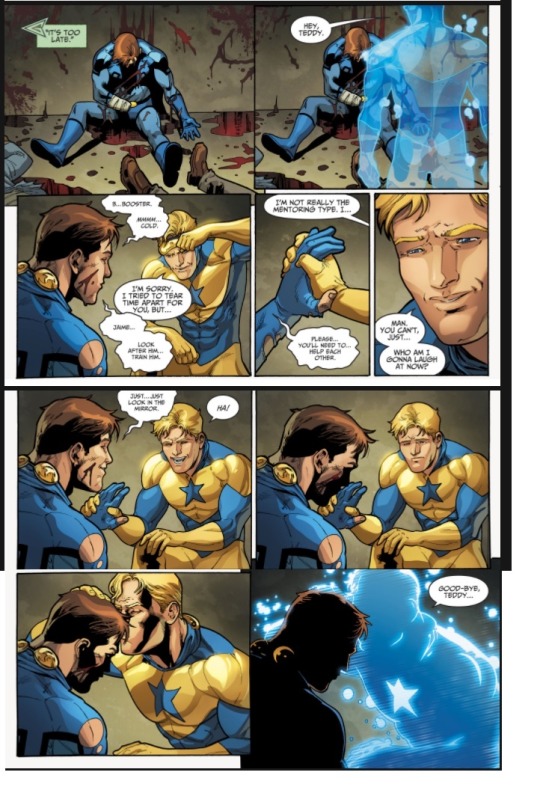
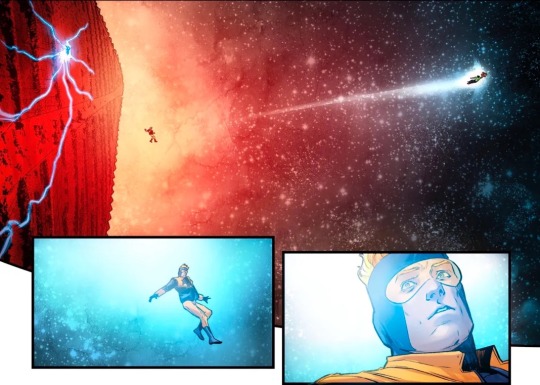
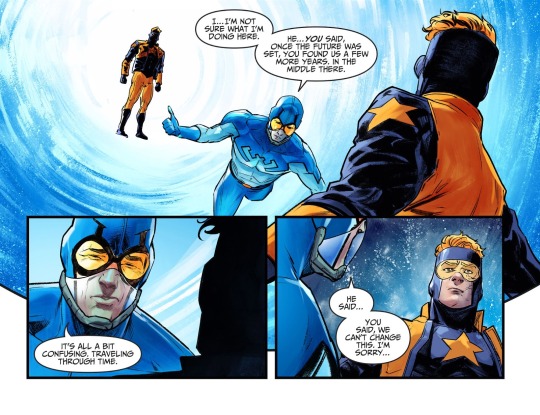
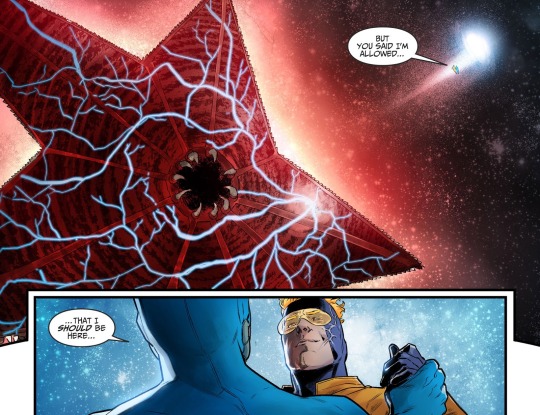
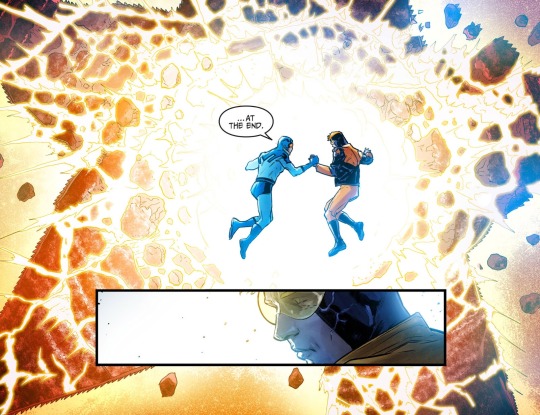
#blue beetle#booster gold#injustice 2 spoilers#ted kord#boostle#they’re so fucking gay#i haven’t even read any of they comics together#but from just these two scenes#oh my god#they should be married in prome continuity on god.
317 notes
·
View notes
Text
"Intelligence is knowing that tomato is a fruit, wisdom is not putting it on the throne of Vegetania."
-Brennan Lee Mulligan and the greatest quote that never was
#dimension 20#the ravening war#dimension 20 spoilers#the ravening war spoilers#the greatest injustice of tomaté's death is that raphaniel never got to whip out this line
351 notes
·
View notes
Text
Jon tries to prove that he knows Injustice Damian by mentioning how much Damian loved Dick, and while I think it's silly for Jon to automatically assume that his Damian and Injustice Damian have the same feelings for Dick, I can still find some satisfaction in the knowledge that, in the main universe, Damian's love for Dick is apparent to others, or at least, obvious to Jon. (Sure would've been nice if they had actually shown Jon making that observation between Dick and Damian or if he could tell based on the way Damian talked about Dick. Alas, DC didn't make time for such a thing.)

Adventures of Superman: Jon Kent #4
"I know how much you loved Dick Grayson and what losing your brother could do to you. And I know you never would have intentionally hurt him."
#it's funny because injustice damian looks exactly like dick here lmao#also it annoys me that the only scraps of dick and damian content we've gotten recently have been from tt's runs#they appeared together in son of kal-el during some kind of potential future scenario#and then now their relationship is mentioned in adventures of superman which is also written by tt#Jon Kent#Damian Wayne#Dick Grayson#tuesday spoilers
261 notes
·
View notes
Text

i forgot to shade mira's cloak im a Sham
#isat#in stars and time#isat fanart#i dont.Think its spoilers??#PLEASE dont look at the backgroundhidesmyface#i literally have so many thoughts abt isat and the world and the characters good lawd#like! do.they have new years?? for the purpose of this.Yes.#why am i physically incapable of drawing A Good(tm) odile and how to i rectify this injustice#whats the kings name?? is it norman?? or perhaps maragreth????? we may never know
82 notes
·
View notes
Text
The Curse finale interpretation
Ash's ascent/death, parallels to pregnancy, and "lived experience" in The Curse
There was a parallel between the way nobody believed or understood Asher when he was stuck in the tree to the way that pregnant people are treated while they are in labor (or even how women are treated in medical settings in general)
Ash's ascent/death
Nobody would believe Ash (besides Whitney who witnessed him floating inside the house and Moses who saw Ash float up into the tree) that he couldn't come down. Everyone who sees him projects their own interpretation of Ash's experience and intentions.
Dougie thinks Ash is running from his responsibilities because Dougie's dad did the same, and (from Dougie's POV), some men panic or even run away from their responsibilities once their partner is in labor or gives birth.
The neighbors from the community think that Ash and Dougie must be filming something because that's is their experience with these outsiders; they are TV people and act strangely, which can be explained by assuming that any weird behavior is a part of making a TV show. This explanation is also the best that they have for how Ash could possibly defy physical law (because it really isn't reasonable to assume that he just is breaking physical law in some way).
Ash repeatedly tells them that he will fly up. He tries his best to explain what he is going through, and he isn't doing the best job, probably because he's extremely afraid that he might die. I repeatedly tells Dougie and the first responders what he needs from them, and nobody listens. They think that Ash is delusional and that everyone else has a better understanding of the situation and therefore know what to do.
Connection to pregnancy
I think some of Ash's experience can be seen as analogous to what pregnant women (and women in medical settings in general) experience. Historically, doctors have been male, and they obviously have never been pregnant or gone into labor, and studies show that even women healthcare providers dismiss women and minorities in medical settings (it has to do with socialized biases in everyone, which I will come back to).
These professionals often dismiss a pregnant person's self-report of needing help, and a CDC report shows that 1 in 5 women report medical mistreatment while giving birth:
Approximately one in five (20.4%) respondents reported experiencing at least one type of mistreatment. The most commonly reported experiences of mistreatment were being ignored by health care providers, having requests for help refused, or not responded to (9.7%); being shouted at or scolded by health care providers (6.7%); having their physical privacy violated (5.1%); and being threatened with withholding of treatment or being forced to accept treatment they did not want (4.6%).
The same report found that the poorer the woman or more marginalized her background, the more risk of facing mistreatment:
Overall, 28.9% of respondents reported experiencing at least one form of discrimination during maternity care (Table 3), with highest prevalences reported by Black (40.1%), multiracial (39.4%), and Hispanic (36.6%) respondents. Overall, the most commonly reported reasons for discrimination were age (10.1%), weight (9.7%), and income (6.5%); reasons varied by race and ethnicity.
Initially Whitney planned to go to what was implied to be a better hospital. It feels like the show maybe wanted the viewer to expect that Whitney would die due to being at a "poor" hospital (and maybe she did; the finale went no full magical realism, imo). Benny and Nathan probably expected that viewers would immediately think or even assume that this would happen (drawing from our own biases, even if they are informed by statistics), which makes me think that Ash's experience is analogous to pregnant peoples' medical mistreatment.
In these medical settings, doctors frequently ignore a pregnant person's self-reports or requests for help, and instead, the doctors and medical staff (regardless of gender) tend to think that they know better or that the pregnant person is delusional/hormonal/emotional/etc. They dismiss their lived experience. Doctors have historically been male, so they have NO experience being pregnant, but they think they know better than the pregnant person, and even women who have been pregnant cannot speak for every woman. It is not rational to take your own experiences and extrapolate them to everyone else (which has been a common theme in the show: making assumptions based off of limited experience or socialized biases).
Like pregnant people facing medical mistreatment, Ash was ignored by health care providers Dougie and First Responders, had requests for help refused, or not responded to; he was shouted at or scolded by health care providers Dougie for running from responsibilities of becoming a father; and had treatment withheld (the anchored net that he repeatedly begged for) and was forced to accept treatment they did not want (tree branch cut off, sending him to his death).
Lived experience, hermeneutical gaps, and epistemic injustice
OKAY. So this comes back to (what I have taken to be) the overall recurrent theme of The Curse: lived experience, hermeneutical gaps/injustice, and testimonial injustice (which are forms of epistemic injustice, for anyone who is interested in learning more about this).
Hermeneutical gaps occur when a person or group lacks the concepts or terminology to describe their experience. Such gaps lead to hermeneutical injustice; Miranda Fricker describes hermeneutical injustice as occurring
when a gap in collective interpretive resources puts someone at an unfair disadvantage when it comes to making sense of their social experiences. An example of the first might be that the police do not believe you because you are black; an example of the second might be that you suffer sexual harassment in a culture that still lacks that critical concept . . . hermeneutical injustice is caused by structural prejudice in the economy of collective hermeneutical resources.
Before the term 'sexual harassment' came to be, people impacted by such harassment didn't have the concepts or terminology to be able to describe their experience or what they were going through; they were often dismissed as just being flirted with or they didn't even discuss their experience because even though the felt like something was wrong, they didn't have the concepts to articulate their experience, particularly to groups who do not have such experiences.
Here, Fricker describes hermeneutical injustice as:
. . . someone has a significant area of their social experience obscured from understanding owing to prejudicial flaws in shared resources for social interpretation . . . The wrong is analysed in terms of a situated hermeneutical inequality: the prejudicial flaws in shared interpretive resources prevent the subject from making sense of an experience which it is strongly in her interests to render intelligible.
So hermeneutical gaps (lack of conceptual resources [words or formed concepts] to describe experience) lead to hermeneutical injustice (where a person's experience is misinterpreted in a way that leads to harm or testimonial injustice).
Testimonial injustice occurs when one party (person or group) dismisses the credibility of another group (basically treating the marginalized person as though they are not a true knower).
An example might be Fernando trying to be heard about his knowledge of the community violence. Whitney dismisses him, thinking that she knows more about systemic issues. Ash takes advantage of this kind of injustice when he tries to cover his lie that Abshir, Nala, and Hani live in transitional housing once they bought the property they live in. Whitney called out the inconsistency, and Ash decided to exploit the lack of credibility marginalized people are usually extended. He says something like "honestly I don't know with them they say one thing then another," implying that they are dishonest.
Connecting Ash's ascent/death and medical mistreatment of pregnant people with overall themes in The Curse
ANYWAY. Pregnant people in labor go through a unique experience, and sometimes they lack the concepts necessary to explain their experience in a way that medical professionals will "understand" or take seriously (hermeneutical gap leading to hermeneutical injustice). Further, medical professionals dismiss a pregnant person's testimony and treat them like they are not credible while the medical professionals work from their own assumptions or formal medical knowledge (testimonial injustice).
Asher does not have the concepts to describe what he's going through. Nobody has experienced what he experienced, and the experience is new to him, so he doesn't know how to convey what he experiences in a way that Dougie and First Responders will understand. Further, Dougie and the First Responders dismiss Ash's testimony and treats him like he's not credible while Dougie and the First Responders work from their own assumptions or ascriptions of Ash's intentions.
Throughout the show, our main characters have made assumptions about poor people, natives, and their own employees. Many of these assumptions arise out of dismissing or discrediting the experiences of others in favor of their own interpretation of events or others' intentions. Whitney (and Ash) thinks she knows what's best for Las Espanola, even though she lacks the lived experience or even the proper educational experience to understand the complex nature of amending systemic injustice. She is like the medical professionals and First Responders who do not listen to the lived experiences (self-reports) of what people want or need.
This behavior necessarily implies that the people she's helping don't know what's best for themselves, which implies that Whitney has some kind of expertise that qualifies her to intervene on their behalf. She actually doesn't; she has no qualification other than she happens to have rich parents, which doesn't really qualify a person for any kind of job, especially one as complicated as amending economic or social injustice.
I didn't expect there to be growth on behalf of the characters (largely because people have pointed out that Safdie brother projects rarely involve any kind of meaningful growth or resolution; they have bleak outcomes), but in the finale, I thought that Whitney (and Ash) had grown. She expresses jealousy and bitterness that Cara was receiving national attention for leaving the art scene while her and Ash's show wasn't even aired; it ended up being direct to app content. She uncharitably criticizes Cara for disliking exploitive collectors, and Whit says that she thinks that Cara quit because no one bought her work. Ash jokes that maybe if Whit quits her project to work in a massage parlor, maybe people will write about her too. Whit bitterly jokes back that she would need some kind of cultural sob story like saying she was making a statement on the Holocaust. Ash says he knows that she's making joke that selling her art retraumatized her but goes on to point out that native people have gone through a lot, which he says that he fully understands where Cara is coming from and that people process tragedy in their own way (discussing Mel Brooks), and Whitney finally concedes that she probably shouldn't be talking the way she is and that she doesn't have that lived experience. He assures her that he considers her Jewish (and that she can make such jokes), but I think the takeaway is that—on some level—Whitney has gained some self-awareness and realizes that her experiences shouldn't inform the way she interprets other peoples' choices and intentions.
The concepts I discussed here might also be connected to the Dunning-Kruger Effect, which is the phenomenon that people (at any level of intelligence or education) learn something and think that they have a better understanding of what is going on than they actually do. When people (like Whitney) decide to act on such false assumptions of self-evaluation, they are likely to make mistakes or perpetuate injustice.
tldr; the real curse (imo) is the insidious implicit biases that are socialized into us and lead us to making assumptions about others' experiences and intentions. These assumptions ultimately create barriers that limit social understanding and social progress. If we all take a moment to examine why we reasoned as we do or where we get our ideas about people who don't share our ethnic, economic, gendered, religious, etc. background, we might find that we are missing the necessary lived experience (a hermeneutical gap) to understand where they might be coming from. Instead of assuming intent or competency or dismissing or being suspicious, we should all charitably interpret others to try to assume the best in and most of other people. It is what we would want others to do for us. Performing this kind of empathy will ultimately lead to developing the necessary empathy to overcome such biases by habit alone, which will create a more compassionate, empathetic, and understanding world, while also deepening and enriching our own lives and the lives of others by celebrating our plurality.
When we allow certain ideas into our head, they become very real to us, and when we act on those ideas without examining them carefully, those false beliefs can cause real harm.
#the curse#nathan fielder#benny safdie#emma stone#a24#showtime#epistemic injustice#hermeneutical gap#hermeneutical injustice#lived experience#spoilers#the curse explained#the curse finale explained#green queen#the curse s1e10#implicit bias#cognitive bias#dunning kruger
72 notes
·
View notes
Text
I spent about 4 hours learning how to do this...
#bg3#baldur's gate 3#wyll#bg3 wyll#astarion#bg3 spoilers#spoilers#fan cam#look wyll HAS NONE I NEEDED TO RIGHT THIS INJUSTICE#EVEN IF IT'S SHITTY#I wanted to trick the astarion girlies and feed the wyllastar shippers#just a little#a treat#my fan cam?#sure#got the munchy's?#y'all can repost this to other sites#I'm not on tik tok so
153 notes
·
View notes